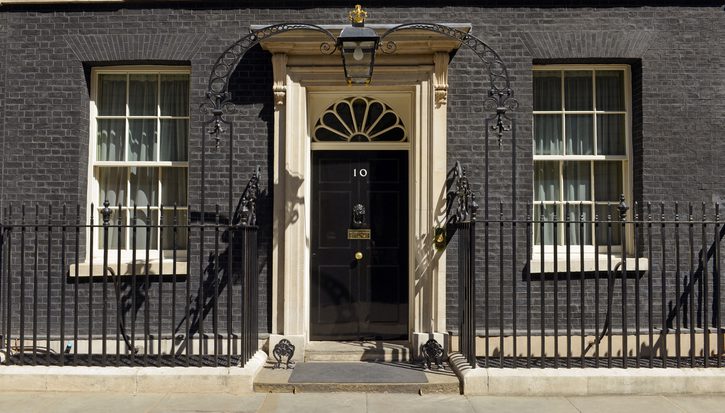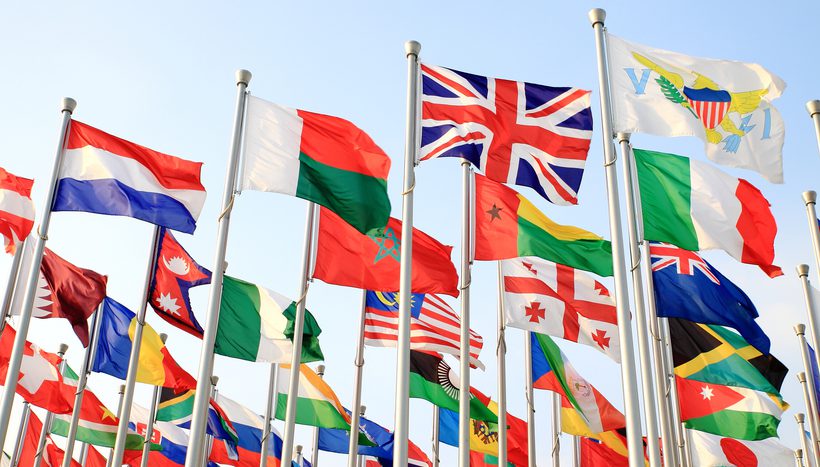
Realism and progress: How should the UK think about international policy in 2024?
Article
Given the current polls, the Labour party looks set to form the next government. It has taken the temperature of the country and, whereas in 1997 its leaders put hope at the heart of their campaign, this time they have chosen to focus on security.
Keir Starmer has stated point blank that “national security is the most important issue of our times”, while Rachel Reeves has put ‘securonomics’ – ensuring that the UK economy is resilient to future shocks – at the heart of her economic approach.
Insecurity comes from many sources, and IPPR’s work already addresses many of these. But it is increasingly clear that some of the most severe risks have an international component – from climate risks to supply chain shocks. IPPR’s new International Programme will take a clear-eyed look at this changed global landscape. It will help policymakers to understand this new era, and provide progressive ideas both to meet its challenges and seize its opportunities.
A whole new world
We are living through a true shift in eras. Looking back helps to make clear how much has changed. The polls suggest that Labour are likely to win the upcoming general election. Thinking back to 1997, the last time Labour entered government, reveals an entirely different context. Over the previous decade the Berlin Wall had come down, Nelson Mandela had been released from prison, and the international community had successfully come together to solve the most prominent international environmental issue – the hole in the ozone layer.
1997 saw Russia join the G7, turning it into the G8, and in the UK the Department for International Development (DFID) was born – an act of far-sighted UK self-interest, as well as a genuine moral commitment to the wellbeing of people beyond our borders. In the next handful of years, the first post-Soviet and Warsaw Pact countries would join NATO, and China would join the WTO. And throughout this period some of the larger developing countries grew so strongly – not least China – that billions of people were pulled out of poverty.
Such was the sense of optimism that Francis Fukuyama (in)famously declared that we were living in the “end of history”. He argued that liberal democracy and the managed market economy had been proved the best and final set of arrangements for governing our economies and societies. Now they would spread to all corners of the world, bringing peace and prosperity with them.
it became apparent that the foundations we were leaning on were faltering, and perhaps had never been as strong as believed
Except history didn’t end.
And while few bought into a very simple view that it had, domestic and international policymaking lent on an assumption that the underpinnings of this socio-economic era – of benign geopolitics, managed market economies and liberal democracy – could persist and even deepen, with smart policymaker support. And this could deliver benefits widely spread across countries, and amongst their citizens.
However, “gradually, then suddenly” (to borrow Hemingway’s phrase) it became apparent that the foundations we were leaning on were faltering, and perhaps had never been as strong as believed. Because, alongside international developments which resembled the “end of history”, there were also other currents, which would ultimately undermine this happy consensus.
Geopolitical competition was re-emerging in new forms. China, for example, invested over $1 trillion in the Belt and Road Initiative, emerging as a strongly attractive partner to many countries in the global south, responding to their priorities quickly and at scale, and without comment on their internal affairs.
China also – despite joining the WTO – never seriously shifted towards the ‘managed market’ approach, with a subsidy regime worth hundreds of billions of dollars per year supporting its economic ambitions. And its desire to develop in high tech sectors created dynamics which went beyond competition into forms of covert conflict, including corporate espionage.
Beyond China, democracy did blossom at the end of the Cold War, with the proportion of countries considered democracies almost doubling, from 30 per cent in 1989 to 54 per cent by 2004. That, however, proved a high water mark, and numbers have fallen slightly since, while authoritarian behaviours have become more prominent – from Narendra Modi in India and Recep Erdogan in Turkey, to Donald Trump in the US.
While ‘talking the talk’ of joint challenges and action, the world’s most powerful countries have not ‘walked the walk’.
Economic growth has slowed in many countries since the global financial crisis - demonstrating that our collective growth model had been far from strong, stable and sustainable. At the same time, inequality within nations has grown, as has the gap between the richest and poorest countries, storing up anger and resentment.
Assumptions about the spread of peace have also proved misguided. The number of active conflicts around the world has increased, and more recently conflict has returned to Europe, in the form of a larger country invading a neighbour. This form of naked state on state aggression once felt like a memory, but no more.
Alongside states’ projections of power in some arenas, in others we have seen too little action. Countries have failed to collaborate to effectively address collective problems, from COVID-19 to climate change. While ‘talking the talk’ of joint challenges and action, the world’s most powerful countries have not ‘walked the walk’. Strong domestic action (e.g. the US’s IRA package, to ensure their green transition) is welcome, but in the absence of a coherent foreign policy counterpart, such approaches risk failing to address the global challenges they set out to address. Climate change won’t be managed – for example – unless the major emerging markets are also set on a clean development path.
In addition, perceptions of exclusivity damage collaboration itself. International institutions, which many countries rely on to deliver coordinated action, have been weakened. And trust is in a poor place. Many of the countries which grew and strengthened their geopolitical identities in the 90s and 2000s, becoming so- called ‘middle powers’, believe that the West has broken its promises. Belief in a global community, and reserves of global solidarity, are at a low point.
Our scientific community and creative industries give us huge soft power, and we have a track record of real international influence
Britain’s role in the world
Where is the UK? We remain fundamentally strong. We are the world’s sixth largest economy, with strengths in many sectors, including those likely to be central in the future global economy, including green products and artificial intelligence. Our scientific community and creative industries give us huge soft power, and we have a track record of real international influence. The UK matters, and can get things done.
Our geopolitical positioning has shifted however over recent decades. Sluggish growth means we have fallen back against competitors; and a difficult few years in foreign policymaking (including a rushed merger between FCO and DFID and dramatic short notice ODA cuts) has made us inwardly focussed, and externally unreliable.
But by far the most profound shift has been Brexit. Brexit was always likely to reduce our global influence, through its expected impacts on economic growth and by removing us from the heart of a major geopolitical and economic bloc. Instead we chose strategic independence, seeking to steer our own course.
However, as the world has become more threatening and more complex, the relative merits of this choice have shifted. In a more threatening world sheer heft – size, wealth and influence – is more important. And in a fast-changing, complex world, strategic independence is only an advantage if you clearly understand the context and your own objectives, and are able to act with nuance and speed. It isn’t clear that the UK has managed this to date. Can we now step up to the challenge?
To be successful, policymakers need to understand the moment not just as a series of threats and crises that demand a response, but as a new era, where old assumptions may no longer apply
Introducing IPPR International
Pull this all together and it’s clear that we now confront an entirely different world of international policy challenges.
To be successful, policymakers need to understand the moment not just as a series of threats and crises that demand a response, but as a new era, where old assumptions may no longer apply. And they need bold new ideas to chart a course in this new world. Progressives, in particular, need to mobilise. The shifts that are under way could drive division, populism and nationalism, undermining the possibility of building a more prosperous, fairer, democratic, peaceful and sustainable world.
That is why – at this vital juncture – IPPR is stepping into this space. With the support of an eminent advisory panel, we have launched a new programme of work on international and foreign policy. This aims to shape the debate on international policy in this election year, while developing into a new international policy centre at IPPR. We believe this work will fill two crucial gaps.
First, there is plenty of high quality technical and geographical analysis available to UK policymakers on different aspects of international policy. However, there is little that surveys the international policy terrain as a whole, or that supports the development of a new policy consensus for today’s geopolitical era, and the challenges and choices that is generating for the UK.
Second, most think tanks and policy analysts working on international policy in the UK are values neutral; while most progressive policy organisations focus almost solely on domestic policy. This leaves a crucial gap for progressive international policy analysis and ideas. Our work will seek to fill this gap, connecting international policy to domestic progressive political projects and policy agendas.
In doing so it springs from IPPR’s mission, which seeks to advance economic, social, democratic and environmental justice.
To be progressive is to recognise that we have a moral connection to citizens around the world, especially the poorest and most vulnerable
In an international context, this has multiple dimensions. In part, it is about securing justice in the UK. As articulated in the phrase “foreign policy for the middle class” (the concept currently guiding US policymakers to consider the impact of foreign policy on the widest range of citizens, not just the very richest), international policy and relationships are central to domestic success. ‘International’ doesn’t sit off to one side, playing a rather distant, supportive role (e.g. negotiating ever more free trade agreements, maintaining relationships in capitals around the world). Rather, international analysis, relationships and policy make the difference between success and failure at home.
This is also about delivering for the UK and other countries together. In a complex, interconnected world, many challenges we face also confront other countries. Acting collaboratively on common challenges - like climate change – can better deliver progressive outcomes for all.
And it is also clear to us at IPPR that being progressive is about more than just enlightened self-interest. To be progressive is to recognise that we have a moral connection to citizens around the world, especially the poorest and most vulnerable. Progressives must extend their solidarity beyond their domestic goals, and not allow those with least resources and power to be left behind.
The scale of the challenge facing the UK and the world in the coming decades is huge. But we have overcome similar obstacles before. In the wake of the second world war, among the devastation and pain, progressives and democrats at home and abroad came together to build a better world, creating the welfare states and the rules-based system we enjoyed for many decades. Today, we must once again come together to navigate instability, imagine a brighter future and generate concrete ideas to help us get there.
Related items

Grasping the nettle: Migration and asylum policy in the next parliament
This blog looks at the big six questions facing the next government on migration and asylum policy.
Supporting people on the 10-year route to settlement in the North West: Briefing for local authorities
This briefing aims to provide local authorities with practical information to support residents on the 10-year route to settlement.
Forging ahead: Deciding the direction of IPPR's Migration Policy Unit
In our last blog post for the Migration Policy Unit we shared our new way of working as we endeavour to be inclusive and transparent in our policymaking process. In this blog we set out what our first and flagship project is for the policy…
